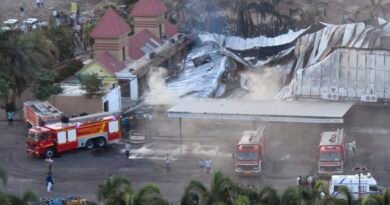Iraqi Terrorist Group Claims Innocence in Alleged Attack on US Forces in Syria
According to regional press reports and U.S. officials cited by Reuters, U.S. bases in Syria have once again come under attack after a three-month hiatus.
Despite reports of renewed attacks on U.S. forces in the region, Kataib Hezbollah, an Iraqi Shiite terrorist group with links to Iran, has denied any involvement.
Recent reports indicate that two U.S. bases in northeastern Syria were targeted by missiles and drones launched from neighboring Iraq.
Kataib Hezbollah, not to be confused with Lebanon’s Hezbollah, is considered a terrorist group by Washington, despite its connections with the Iraqi government.
On April 22, Kataib Hezbollah refuted online claims that they had resumed attacks on U.S. forces in the region, labeling the reports as “fabricated news.”
According to an unnamed U.S. official, several rockets were fired from Iraqi territory at a U.S. base in Syria’s northeastern Hasaka province.
No U.S. personnel were harmed in the failed rocket attack, and U.S.-led coalition aircraft retaliated by striking a launcher in Iraq believed to be responsible for the missile launch.
Reports from Iran’s IRNA press agency have alleged that two U.S. bases in Syria were targeted by missiles and drones. The extent of damage or casualties resulting from these attacks remains unconfirmed.
Currently, around 900 U.S. troops are stationed in eastern and northeastern Syria, while approximately 2,500 remain deployed in Iraq as part of the U.S.-led coalition’s efforts against ISIS.
In the midst of escalating tensions between Israel and Iran, the latest attack on U.S. forces in Syria occurred following Iraqi Prime Minister Mohammed Shia al-Sudani’s recent visit to Washington to meet with President Joe Biden.
Efforts to end the U.S.-led coalition presence in Iraq have gained momentum, with Iraqi officials increasingly calling for the termination of the coalition’s mandate, citing a lack of necessity.
The meeting between President Biden and Mr. Al-Sudani was overshadowed by regional tensions, including Israeli airstrikes on Iranian targets in Syria and subsequent retaliatory actions by Iran.
As events unfold and regional dynamics continue to shift, the situation remains fluid, with ongoing concerns about the stability and security of the Middle East.



